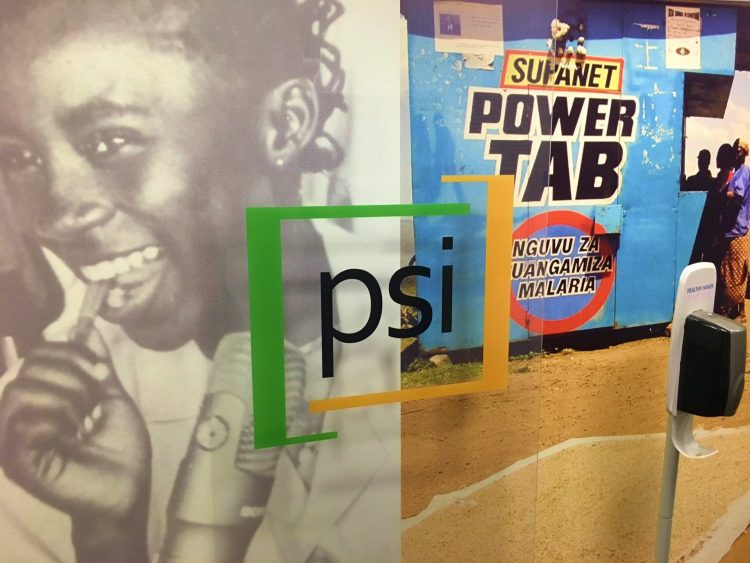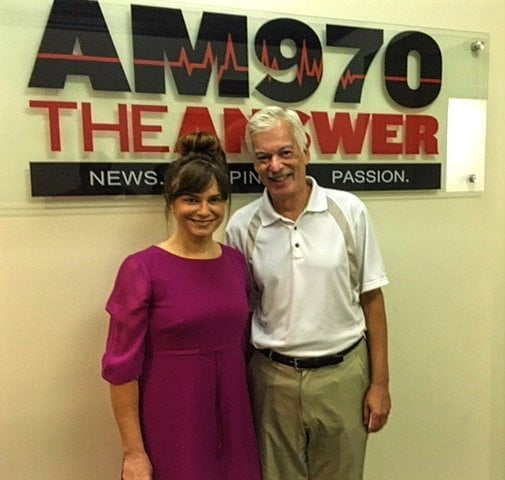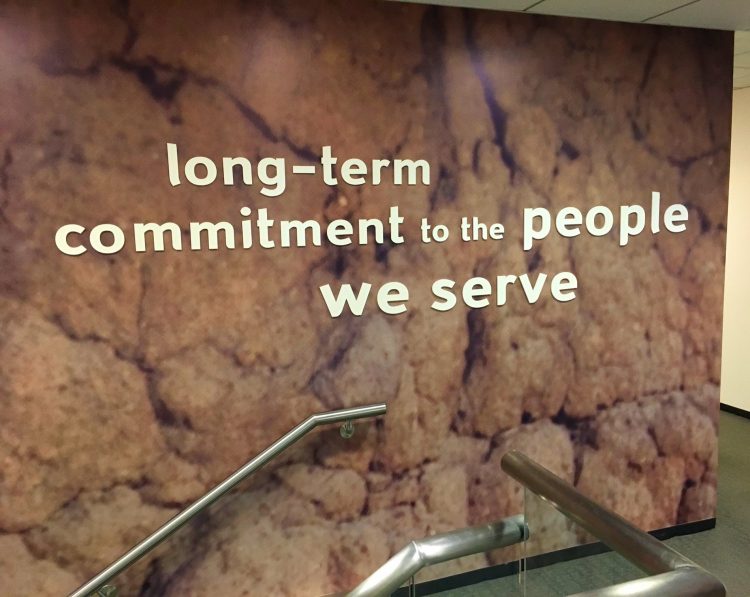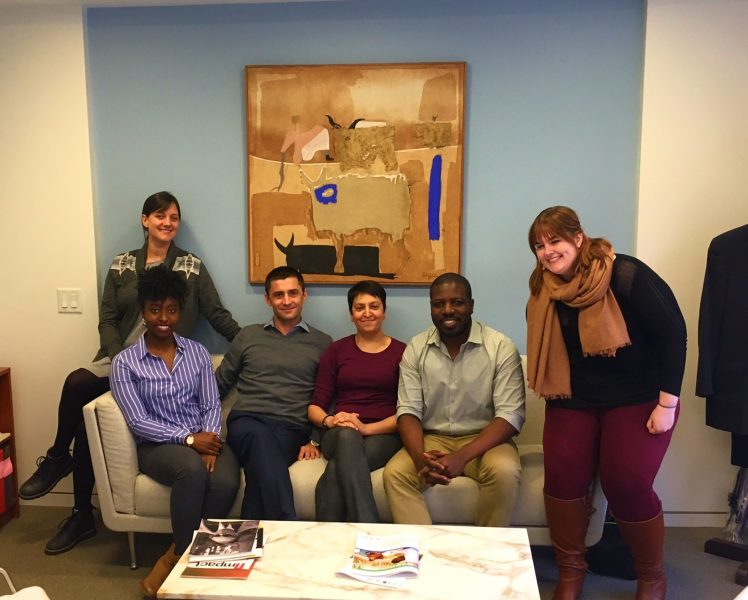Better Than Most is a regular feature of The Business of Giving examining the best places to work among social businesses and nonprofit organizations.

Transcript
Denver: And this week’s Better Than Most takes us to Washington, D.C., at the offices of Population Services International or PSI, one the blue chip names in global health.
We’re going to start with Kate Roberts who leads the Maverick Collective, one of the initiatives of PSI, and then hear from other members of the staff.
Kate: Well, first of all, I should say that PSI is one of the largest health organizations in the world that nobody has ever heard of. We have about 9,000 employees… big organization. We have about $600 million annual budget. PSI focuses on market solutions for health programs. So we’re obsessed with measurement, and really our goal is to provide universal health care to the poor.

Kate Roberts and Denver Frederick
Maria: I really want to talk about Karl Hofmann, our CEO. I like to say he’s like the godfather I always wanted. I’ve been to meetings with him, conferences abroad with him, and he’s always been incredibly accessible, very easy to talk to. He’s been very high up in his diplomatic career. He has “ambassador” in front of his title if you want to get technical, but he’s so easy to talk to. He has brown bags every quarter with all 250 of us. I just love Karl. He’s my favorite.
Pierre: Let me speak from the heart to say that one of the reasons that I value working at PSI is around this corporate culture of honesty. And what does that mean in practice? One of the beautiful things– when I moved here in Washington about 2014– that I started seeing was people admitting when things were going wrong, people admitting when they made mistakes. And that goes from Karl Hoffman to anybody else in the organization. And it’s (a) a really refreshing thing because it allows people to make mistakes; (b) it’s really productive because it means that it lances the boil of tension that is caused when people are quickly trying to find blame, and allows people to just move on, find a solution, and as my colleagues have been saying, “get things done.” So, honesty.
Kristely: So I graduated from GW in MPH program about two years ago, and I remember being in school, and PSI always coming up as a golden star in global health. So when you see or hear about PSI, you think it’s like the “Ivy League” of global health. So coming here, I was really excited about it, but I was also scared because it’s the “Ivy League” of public health. But I was really surprised to see that work-life balance is really important here.
Yasmin: I think if somebody were to say what makes PSI different from any other organization in development, it’s the value we put on action, and that’s right from our country programs to everybody here. We deal with intractable problems in development. It can seem like it’ll take a lifetime to do things like find the fix for HIV or malaria, but what PSI has managed to do through numbers, through programs, is make that real. So every single employee in this building… or in any of our field programs—and we have 9,000 of those in about 50 countries—will be able to say what they did today that led to a better market, or a better program for somebody that they have identified as their consumer… right that day. I think very few organizations in development can give that link of my action to my impact… to what gets measured for the whole organization.
Taylor: Someone with a lot of energy is a PSIer, and I think another key factor of being a PSIer, which I didn’t know when I started but ended up working out nicely with my personality, is a high degree of irreverence. I don’t think many PSIers take themselves very seriously. I think there’s a lot of trying to keep things light. As Yasmin said, we deal with some really serious issues, and you could get kind of bogged down in that, and that’s not the vibe at PSI at all. Fun, like people just really bringing their full selves.
 Sandy: And what I love about PSI is that we have this—it’s actually part of our character– we’re locally rooted, but globally connected. PSI and the nature of this organization is that many of what we call our affiliates or members are actually locally grown organizations. They have their own boards of directors. They have their own staff that come from the local population. So for me, it’s really good to see that ideas are coming from the countries themselves and not just being dictated from Washington.
Sandy: And what I love about PSI is that we have this—it’s actually part of our character– we’re locally rooted, but globally connected. PSI and the nature of this organization is that many of what we call our affiliates or members are actually locally grown organizations. They have their own boards of directors. They have their own staff that come from the local population. So for me, it’s really good to see that ideas are coming from the countries themselves and not just being dictated from Washington.
Yasmin: I was going to say I love the question: “How do you unite 9,000 people over 50 countries to make them feel part of an organization?” Internet and social media is one answer, and we do it the old-fashioned way. If you ask anybody anywhere in the world who works for PSI: “Why do you wake up in the morning?” They’re going to say, “Sara”. And what we mean by that is our consumer. We don’t say the marginalized population. We don’t say beneficiaries. We don’t say people who need our assistance. We give them the dignity of being a consumer. We give her a name, and we really make an effort to study who she is, what motivates her, what is her life like beyond the health problem. You can show up anywhere in any language, and that’s what brings 9,000 employees together. We wake up for our consumer, to give her the choice of living the life she wants and having the family she desires. And that sounds like a mission statement and, honestly, it is. But it’s a mission statement I think 9,000 people with or without social media relate to.
Taylor: It’s just very exciting. My former team had a stuntman on it. So he had worked in Los Angeles. He’s in the Screen Actors Guild. He was a stuntman in LA for a few years. Then he got into innovation and doing design thinking and brought that to PSI. We had another person on staff who worked for Sesame Street and worked in public television, brought playfulness and that childlike quality which we have in spades at PSI. Karl, the ambassador background is not necessarily public health focus. So, yes, I think there’s just a very diverse set of perspectives and hopefully, it’s not an echo chamber. You don’t put out an idea and everyone nods their head and says, “Yes. That’s exactly right.” You have people saying, “Well, what if we did it this way?” or “I disagree with that.” Just adds to the quality of the work we put out.
 Denver: Special thanks to Maria Dieter for organizing my visit, and to the others who also participated in the segment: Taylor Schaffter, Sandy Garcon, Pierre Moon, Kristely Bastien and Yasmin Madan. Now, if you go to denverfrederick.wordpress.com, we have this podcast with the transcript and pictures of the participants and the offices of Population Services International.
Denver: Special thanks to Maria Dieter for organizing my visit, and to the others who also participated in the segment: Taylor Schaffter, Sandy Garcon, Pierre Moon, Kristely Bastien and Yasmin Madan. Now, if you go to denverfrederick.wordpress.com, we have this podcast with the transcript and pictures of the participants and the offices of Population Services International.
*The Business of Giving can be heard every Sunday evening between 6:00 PM and 7:00 PM Eastern on AM 970 The Answer in New York and on iHeartRadio. You can follow us @BizofGive on Twitter and at Facebook.com/BusinessOfGiving.

